Crypto has gone mainstream, and governments are paying attention. In 2025, here is How to Pay Crypto Taxes tax authorities worldwide are tightening rules on Bitcoin, Ethereum, and altcoin profits. Whether you made money trading, staking, or even flipping NFTs, you may owe taxes.
The problem? Most beginners have no idea how crypto taxes work. Some think they’re invisible, others panic and overpay. The truth lies in between.
In this post, we’ll break down how to calculate, report, and pay crypto taxes in 2025, no matter where you live.
Why You Need to Pay Crypto Taxes
In most countries, crypto is treated as property or capital assets.
That means profits from selling or swapping coins are taxable. Ignoring crypto taxes can lead to:
- 🚩 Audits from tax authorities
- 🚩 Heavy fines and penalties
- 🚩 Freezing of bank accounts
It’s better to pay your fair share than risk losing everything.
What Counts as Taxable in 2025
- Selling Crypto for Cash – Example: Selling BTC for USD.
- Trading Crypto-to-Crypto – Example: Swapping ETH for SOL.
- Using Crypto to Buy Goods/Services – Paying with crypto = taxable.
- Staking or Yield Farming Rewards – Considered income.
- NFT Sales – Profits from NFTs are taxable too.
What’s NOT Taxable
- Holding crypto without selling.
- Transferring coins between your own wallets.
- Receiving crypto as a gift (in most countries, but check local laws).
How to Calculate Crypto Taxes
Crypto tax is usually split into two categories:
1. Capital Gains Tax
When you sell crypto for more than you bought it, the profit is a capital gain.
- Short-term gains: If you held for less than a year (usually taxed higher).
- Long-term gains: If you held for more than a year (lower tax rate in many countries).
2. Income Tax
If you earn crypto (from staking, mining, or freelancing), it’s taxed as income at your regular tax rate.
Tools to Make Crypto Taxes Easy in 2025
- Koinly – Tracks trades across wallets and exchanges.
- CoinTracker – Syncs with Coinbase, Binance, and more.
- TokenTax – Great for U.S. investors.
- Accointing – Easy interface for beginners.
💡 Tip: Always download your transaction history at the end of the year to avoid missing data.
How to Report Crypto Taxes
- Keep Detailed Records – Dates, amounts, purchase prices, sale prices.
- Use a Crypto Tax Software – Automates calculations.
- Include in Annual Tax Filing – Report alongside your regular income.
- Consult a Tax Professional – Especially if you made big profits.
Avoiding Mistakes in 2025
- ❌ Don’t think the government “won’t notice.” Most exchanges now share data with tax authorities.
- ❌ Don’t mix personal and business wallets — it complicates records.
- ❌ Don’t panic sell to cover taxes; plan ahead.
Conclusion
Crypto taxes might sound scary, but they don’t have to be.
With the right tools and knowledge, you can stay compliant without overpaying.
In 2025, governments are stricter than ever, but smart investors know: paying taxes is part of the game. Stay organized, track your trades, and you’ll keep more of your profits in the long run.
At BullRunHat.com, we’ll keep you updated on the latest crypto tax rules and strategies so you can focus on growing your portfolio without fear of the taxman.




